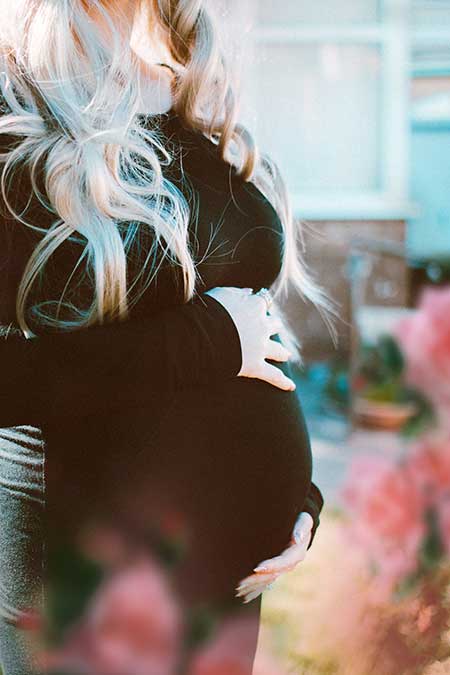The Pregnancy Journey Week by Week

Week 1-2: A lot is happening now, but you can’t see it with the naked eye. This is when your body is ovulating and your uterus is getting ready to possibly conceive by the thickening of the uterine wall and releasing an unfertilized egg.
Week 3: Here is the big moment. This is the week where ovulation and implantation can occur. When the one single sperm meets the egg, there you have it…conception. At conception, the fetus’ eye color, hair color, gender and more have already been determined.
Right now, the fetus is actually called an embryo and some major things are happening. The embryo’s brain, spinal cord, heart and gastrointestinal tract are all being developed.
Week 4: It’s now time to take a pregnancy test. Most women discover their pregnancies between weeks 4-7. Pregnancy symptoms may start to develop such as a missed period or breast tenderness.
Your embryo is experiencing some major growth here. The beginning stages of the nervous system, skin, nails, hair, mammary glands, sweat glands and enamel for teeth begin to develop. Also, the foundations of heart, lungs, skeletal system, liver and much more are being laid. Even arms and legs begin to develop this week.
Week 5: It’s a good time to come into Bridges and make your first appointment with us. Since ovulation times are different for every woman, it’s important that you take a free, medical grade pregnancy test and receive a free ultrasound so we can determine exactly how far along you are. You may begin experiencing morning sickness during this week.
Your embryo’s heartbeat is steady and the eyes and ears are forming.
Week 6: You may begin to experience more pregnancy symptoms by week 6. Heartburn, some light cramping and light bleeding are super normal this week. Your breasts may still be pretty tender and you might even notice that they make look a little bit darker than normal.
Your embryo is already beginning to develop fingers and toes. Plus a little nose, jaw and palate are forming. The lungs and brain are also continuing to develop.
Week 7: You may still be experiencing morning sickness and maybe some possible weight gain. It’s also possible to have lost a couple of pounds due to morning sickness. You might be experiencing some mood swings and cravings too.
Your embryo is now developing a tongue, hair follicles and eyelids. Every essential organ that a human being needs to survive has already been forming at this point.

Week 8: It’s a good time to either begin or continue your prenatal care during week 8. Begin taking prenatal vitamins, continue with healthy eating and lifestyle choices. Before you were pregnant, your uterus was the size of a fist. By week 8, it’s the size of a grapefruit!
Your embryo now contains every body part that an adult has but they are not fully developed. The facial features begin to become more defined, and its muscles are even able to contract.
Week 9: You may not look pregnant on the outside, but you may begin to feel pretty bloated and your pants may start to feel snug. Some of the pregnancy symptoms may have disappeared and others surfaced.
Now called a fetus, it is ready for some pretty major weight gain. The fetus can also start sucking its thumb this week.
Week 10: Your newly pregnant body is still experiencing pregnancy symptoms, but you may have developed some good coping strategies on how to alleviate those.
The fetus’ kidneys, liver, brain and lungs are now functioning. Plus, fetuses start to kick their newly developed legs this week.
Week 11: Your body is continually changing along with the ever-changing fetus. Many women notice hair and fingernail growth during this time in pregnancy. However, not all women will show their pregnancies at this point. Some may notice a small bump while it may not be noticeable with others.
Your fetus is very active at this point. The skeleton is beginning to harden and your fetus’ head is almost half of its entire length.
Week 12: You are almost out of your first trimester at this point. Your ever-growing uterus is expanding. Depending on if this is your first pregnancy or not, you may already be needing maternity clothes.
Your fetus is continually growing, as well. Its kidneys can now secrete urine and the facial features become more recognizable.
Week 13: You are almost done with the fist trimester of pregnancy. You might notice some stretch marks here and there as your body is meeting the needs of the growing fetus.
Your fetus now has its very own fingerprints.
Week 14: Congratulations! You made it into the second trimester! Your early pregnancy symptoms may start to subside a little bit and you might start feeling more like yourself again. Your breasts are preparing for lactation and my have become swollen and tender.
Because of your fetus’ developing brain, it can now make facial expressions with its facial muscles. Its liver and spleen have also begun to develop more.
Week 15: Most women will have gained 5 pounds by this point. Don’t worry if you’ve gained more or less. Continued prenatal visits are good to ensure you have a healthy weight gain and that the fetus is developing appropriately.
You can actually see your fetus’ skeleton on an X-Ray if it were taken this week.
Week 16: You may be experiencing that “pregnancy glow” due to the increased blood volume and overactive oil glands.
Your fetus’ circulatory and urinary systems are beginning to function now, along with some other body systems.
Week 17: Most women see a noticeable baby bump by now. Your other internal organs begin to make room for your growing uterus.
Your fetus’ hearing is beginning to develop.
 Week 18: Bring out the maternity clothes! Your growing fetus needs some extra room. You may also notice some dizziness as well. This is due to possible low blood pressure caused by your cardiovascular system being affected by the pregnancy.
Week 18: Bring out the maternity clothes! Your growing fetus needs some extra room. You may also notice some dizziness as well. This is due to possible low blood pressure caused by your cardiovascular system being affected by the pregnancy.
Your fetus’ genitals are beginning to form externally now. It is typically possible to distinguish whether it’s a male or female on an ultrasound by this point.
Week 19: Due to the growing fetus, you may experience round ligament pain. This is very normal and happens when your ligaments have to stretch to compensate for the growing fetus.
As other parts of the fetus’ development continue, hair is beginning to grow on the fetus’ head.
Week 20: You made it halfway through your pregnancy! Yay! Typical weight gain at this point is between 8-10 lbs.
Your fetus is beginning to produce meconium (which then becomes the big first diaper change after birth).
Week 21: Most women really enjoy this time in pregnancy. You are over the first trimester and you’re belly is not too big to keep you from doing most things. You may be able to feel the fetus move at this point. Continue a healthy diet and light exercise. Enjoy this time!
Your fetus is now swallowing amniotic fluid and the digestive system is continuing to develop.
Week 22: You may notice some swelling in your feet or legs at the end of the day. If so, just take some breaks during the day to give your feet a rest.
Week 23: The fetus is totally laying on your bladder. You may notice you have to use the bathroom more often.
Your fetus is beginning to gain weight rapidly and looks more and more like a newborn baby.
Week 24: With the continued growth of your fetus, you might begin to feel itchy as your skin stretches. Stretch marks are very normal. Feel free to apply lotion to help ease the itchiness.
Your fetus’ brain is developing quickly. It is also beginning to develop taste buds during this time.
Week 25: Right now, the uterus is the about the size of a soccer ball.
Your fetus’ gender should be distinguishable with an ultrasound by now (or even before).
Week 26: Most women at this time have gained between 16-22 lbs. Continue with a healthy diet and regular prenatal visits to ensure you are experiencing a healthy pregnancy.
Your fetus’ lungs are continuing to develop and it is actually able to respond to sound.
Week 27: You should be feeling your fetus kicking and moving around all the time. You may also be feeling movements like hiccups too. Keep track of the movements because a sharp decrease or no movement could be a sign of potential distress on the fetus. If you have any questions, contact your doctor.
Your fetus may be able to open its eyes at this point and now has a regular sleep and wake cycle. Let’s just hope it’s the same as yours!
Week 28: You are now in the long stretch…the third trimester! Now the fetus is taking up more space and your organs have to adjust. You may notice some constipation or some leg cramps.
Your fetus is continuing to gain weight and has eyelashes and eyebrows.
Week 29: The average weight gain at this point is between 19-25 lbs. Prenatal massage is a good way to relax overextended muscles and ligament pain.
The fetus is experiencing some pretty amazing brain development. Make sure to continue to eat foods that are high in folic acid and other vitamins. Plus, continue taking those prenatal vitamins.
 Week 30: You may be experiencing some insomnia. This is very normal since it can be hard trying to find a comfortable position to sleep. Try sleeping with a pregnancy pillow to help you rest.
Week 30: You may be experiencing some insomnia. This is very normal since it can be hard trying to find a comfortable position to sleep. Try sleeping with a pregnancy pillow to help you rest.
The fetus is continually growing and now able to distinguish between light and dark inside the womb.
Week 31: During this time, you might have noticed a yellowish substance leaking from your breast. This is totally normal. It’s called colostrum and it’s what your body makes in the beginning stages of lactation (breastfeeding).
Your fetus is continuing to gain weight and develop its lungs.
Week 32: You may experience Braxton Hicks contractions during this time. They are completely normal and it’s your body’s way to “practice” labor. If you are not aware if you are experiencing Braxton Hicks contractions or real labor, contact your doctor.
Your fetus is continuing to gain weight and is developing its lungs.
Week 33: Some women can get a little nervous that their “water” will break. Amniotic fluid is odorless and colorless. If you are unsure if your bladder had a leak or if your amniotic sack has ruptured, try smelling it to tell the difference. If you are still unsure, contact your doctor.
Your fetus’ bones are all beginning to get hard (except for the skull which needs to remain moldable for delivery).
Week 34: Your body is continually preparing for delivery with each passing week. Make sure to still do light exercises like walking and allow yourself to rest when you become tired.
Your fetus’ central nervous system is still developing and its still gaining a consistent amount of weight.
Week 35: You may be experiencing a little bit of shortness of breath. That’s because the uterus is pressing against the rib cage.
The fetus is pretty much done growing by this point. It will continue to gain weight but the kidneys have totally developed. Since there is less room for the fetus to kick, you should still be able to feel it move consistently.
Week 36: People may begin to tell you that you’ve “dropped.” That just means that the fetus is now engaged in the pelvis. It helps with the shortness of breath but might keep you up at night with trips to the bathroom.
Most fetuses at this point are head down toward the pelvis.
Week 37: Getting close to delivery! Braxton Hicks contractions may still be preparing you for labor and the doctor may check to see if you are dilating.
Your fetus is continually enjoying its womb for the time. But move-out day is approaching!
Week 38: You may notice you have passed the mucus plug. It helps keep bacteria from entering the cervix during pregnancy. When you pass the mucus plug, it’s a great indicator that you may be dilating.
All of the fetus’ organs are fully functioning (except the brain and lungs which continue to develop after birth).
Week 39: Although it’s normal to experience swelling during your pregnancy, make sure you are keeping a good eye on severe swelling as it could be a sign of preeclampsia (it can be a dangerous condition). Check with your doctor if you have any questions.
Your fetus is still gaining weight.
Week 40: Full Term! You and your doctor have probably already talked about birthing possibilities and what to do if you go over 40 weeks. You pregnancy has been a continual journey of preparation for labor.
Most full term babies are between 19-21 inches and 6 ¾ – 10 pounds.
